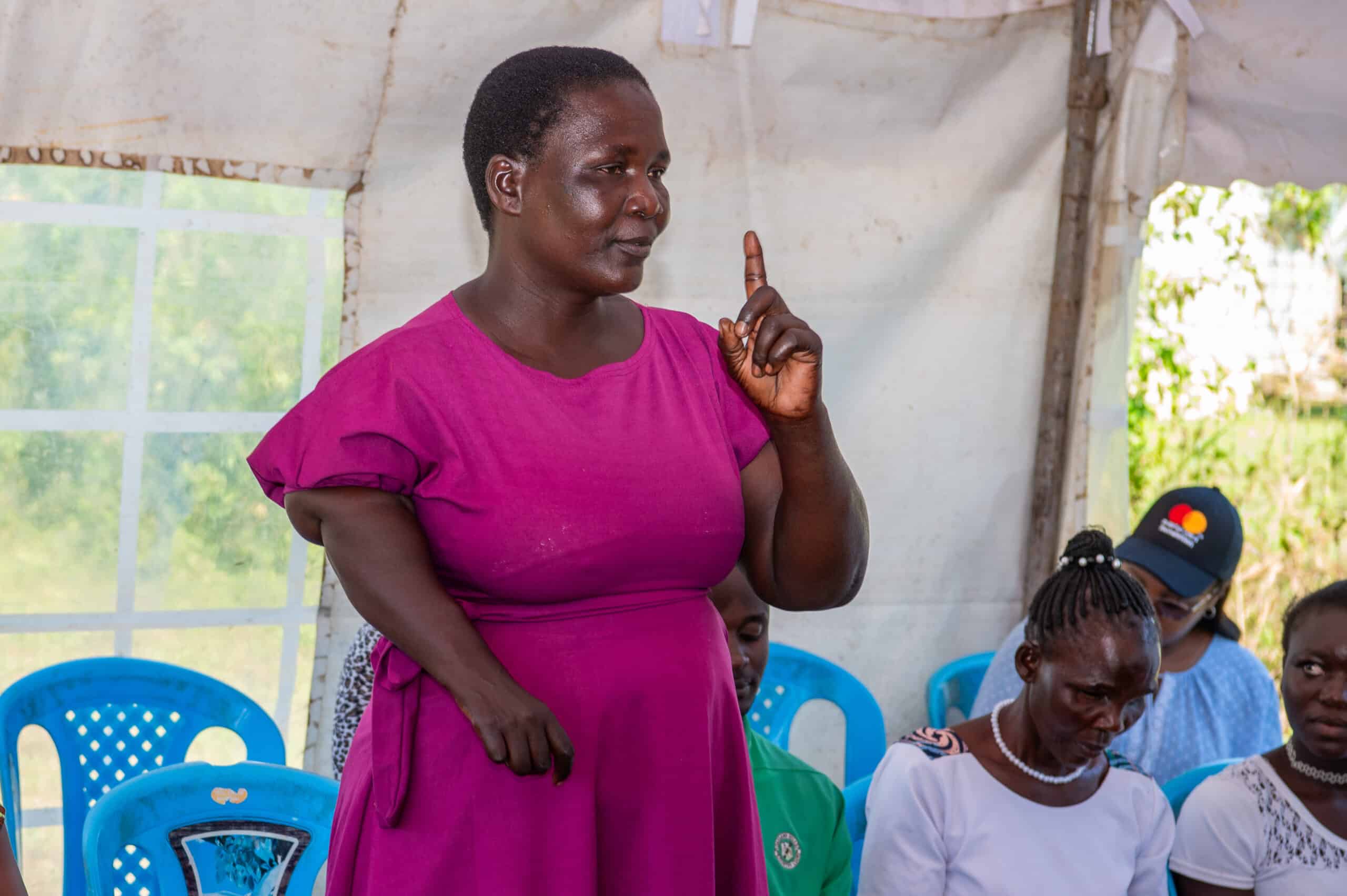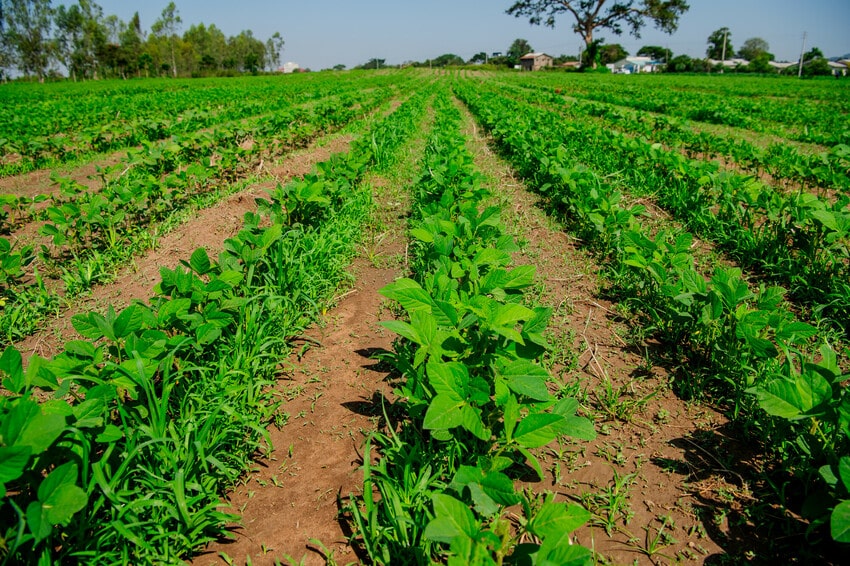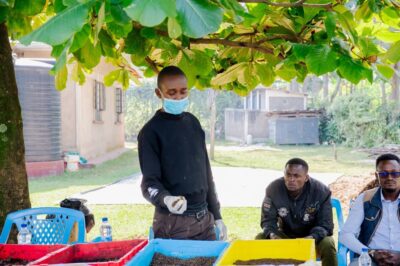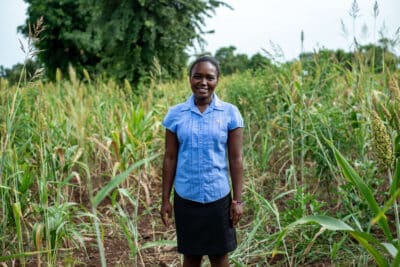News
Kenya
3 December 2024
Persons with disabilities leading the way in soybean production

Everlyne Namu, the Chairperson Amase Group for Persons with Disabilities(left) and group secretary Abigael Odunga weeding out grass in the soybean plantation in Alupe, Busia County. Photo: Farm Africa / Maurice Goga.
In western Kenya, persons with disabilities are planting soybeans with the hope of transforming their lives.
The Chakol and Amase Persons with Disabilities (PWDs) groups first formed in Alupe, western Kenya in 2013 with the aim of improving their members’ futures. Over the years, the groups have taken part in table-banking initiatives but have continued to struggle to sustain their activities due to the harsh economic situation experienced in the country.
The younger members of the group face additional challenges. “Our group has 45 members, most of whom are young people who have completed secondary school but are unable to secure employment due to their disability status,” explains Agnes Auma, the chairperson for the Chakol PWDs group.

Agnes Auma, chairperson for the Chakol PWDs group. Photo: Farm Africa / Maurice Goga.
An inclusive opportunity
Things changed this year when the groups were presented with an opportunity to join the Youth in Sustainable Aquaculture programme.
This programme, led by Farm Africa in partnership with the Mastercard Foundation, aims to build a thriving and dynamic fish farming industry in Kenya to create 150,000 sustainable, meaningful and dignified work opportunities for young women and men including persons with disabilities (PWDs) and internally displaced persons (IDPs).
The Chakol and Amase PWDs groups are growing soybeans. High in protein and lipids, soybeans will be used in the production of high-quality fish feeds that fish farmers will require in large quantities for use in the fish farming enterprises that the programme is supporting.
”Following our partnership with Farm Africa, we have received comprehensive training on soybean farming that has enabled us to take up the journey of successful soybean cultivation.” Agnes recounts.
“The initiative does not only aim to create gainful employment opportunities for the PWD but also works towards strengthening the entire aquaculture value chain."
Teddy Nyanapah
Farm Africa Programme Manager
‘‘Establishing a supply network for high-quality fish feed is an essential step in building a thriving aquaculture industry in Kenya,’’ Farm Africa Programme Manager Teddy Nyanapah explains.
“The initiative does not only aim to create gainful employment opportunities for the PWD but also works towards strengthening the entire aquaculture value chain through its contribution to the supply of raw material used for the production of affordable, high-quality fish feed to be accessed by fish producers. This will enable fish farmers to increase their production, productivity and profit, thereby opening up more job opportunities for young women and men across Kenya.”
Getting started
With support from Farm Africa and the Kenya Agricultural and Livestock Research Organisation (KALRO), the groups now have their first crop underway, with both successfully planting 30 acres.
“We were provided with land and soybean inputs which has enabled us to establish the good crop we are currently seeing,’’ explains Amase group chairperson Everlyne Namu. “Our soybean is doing well, and I believe that by next year, our lives will have been transformed.”

The soybean plantation in Alupe, Busia County, Kenya. Photo: Farm Africa/ Maurice Goga.
A life-changing opportunity
The two groups are excited by the prospects of their new enterprise. “Soybean farming will change our lives by creating jobs for our young women and men, keeping them engaged and productive,” predicts Everlyne.
She adds, “From the 30 acres, we expect to earn between six hundred thousand and one million Kenyan Shillings [approximately UK £6,000]. This will allow us to command respect from those who currently despise us. The community will witness our children going to school, and our young members who wish to further their education will also be able to do so.”
"This will allow us to command respect from those who currently despise us. The community will witness our children going to school, and our young members who wish to further their education will also be able to do so.”
Everlyne Namu
Amase PWD group chairperson
Driving ambitions
The groups have high expectations.
In addition to the 30 acres of soybeans they are cultivating, both groups have submitted their applications for the Programme’s Challenge Fund.
YISA programme provides grants or matching funds to small and medium-sized enterprises that have innovative ideas and present opportunities to create work opportunities for young women and men, persons with disabilities and internally displaced persons in Kenya. The grant will enable each group to acquire mechanised equipment that will greatly ease farm operations for the PWDs.
“We expect a lot from this programme. I am hoping that our group can secure mechanised equipment to help us perform our farm operations with ease,” shares Chakol group chairperson Agnes.
“I truly appreciate the inclusive nature of this programme, as it has brought persons with disabilities on board, something that most projects usually overlook.”
Agnes Auma
Chairperson, Chakol PWDs group
More about the Youth in Sustainable Aquaculture (YISA) programme
The five-year programme is being implemented across six counties in Kenya, namely Busia, Homa Bay, Kakamega, Kilifi, Kisumu and Siaya.
The programme launched in 2023 and is led by Farm Africa in partnership with the Mastercard Foundation and six consortium partners: Echo Network Africa, Lattice, Aquarech Limited, Ramogi Institute of Advanced Technology, Hydro Victoria and Livingwood Consultants.
Learn more about the ways Farm Africa is helping to boost youth employment.
Learn more about Farm Africa’s expertise in fish farming.




